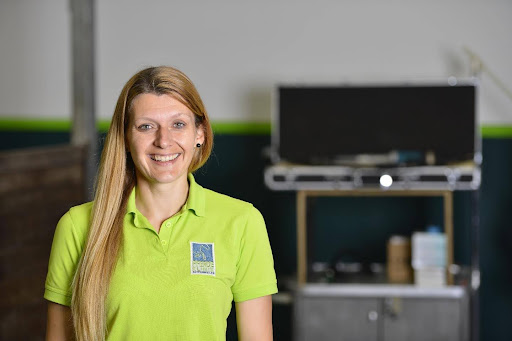In equine veterinary medicine, optimizing the performance of sport horses is essential to ensure their well-being and success in competition. Claudine Anen, a veterinarian specialized in equine sports medicine, shares her experience with the EQUIMETRE VET.
Can you introduce yourself?
My name is Claudine Anen. I am an equine veterinarian, currently based in Germany. My main expertise focus is sports horses, equine sports medicine, and rehabilitation. I also work as a consultant in both Germany and Sweden.
Who are your main customers? What are your main activities as a veterinarian?
In Sweden, my role involves taking care of sport horses, eventing horses, and many trotters. However, in Germany, it mainly concerns dressage horses and racehorses, particularly thoroughbreds.
How did you hear about Arioneo?
I had come across advertisements about the technology, which led me to start using EQUIMETRE VET. I wanted to have a functional system in my practice.
What challenges and objectives led you to invest in a solution like EQUIMETRE VET?
To have a better approach to addressing underperformance and detecting poor performances in horses, as well as identifying their causes. I also chose EQUIMETRE VET based on the validation that Emmanuel Van Erck presented during her lectures.
What advantages do you believe EQUIMETRE offers in monitoring the performance and health of race/sport horses compared to traditional methods (telemedicine, etc.)?
What I appreciate about EQUIMETRE VET is the wide variety of data recorded during a training session. It’s not just about heart rate and recovery, but also stride frequency and stride length.
What do you look for in the data?
A unique feature of EQUIMETRE VET is the ECG, which is recorded during each horse training sessionry unique feature of EQUIMETRE VET is the ECG, which is recorded during each training session of the horse. This allows us, particularly for eventing and racehorses, to make visible what is happening inside the horse.
Otherwise, this is not possible. For example, when the heart rate drops as speed decreases, it can fall by 50% in just a few seconds. Therefore, it is impossible for us, as veterinarians, to truly detect what is happening in a horse during a performance.
Does this technology help you make more informed decisions regarding the health and performance of horses?
The use of EQUIMETRE VET in long-term training follow-up for horses with varying pathologies sometimes allows us to continue training rather than stop the horse.
What are your thoughts on the integration of technology in the field of equine health?
Using this technology during the training of sport and leisure horses ensures that you do not put the horse in unfavorable conditions during training. By obtaining results from the EQUIMETRE VET technology, you can ultimately decide whether to slow down the training or intensify the session.
What do you see as the future potential of this technology in equine veterinary medicine and its potential impact on racehorses?
This technology will be a very valuable tool in the future for equine veterinary medicine, as it will facilitate the detection of minor pathologies in our equine athletes, while also providing a means for monitoring your patients and designing specific training programs for each athlete.
Keywords : Veterinarian, EQUIMETRE VET, technology, horses, sport, heart rate, ECG, performance, speed, evolution, training, detection.


